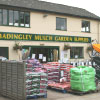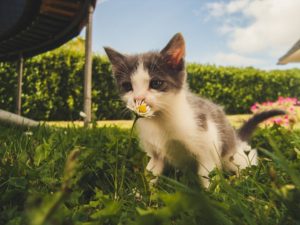How to Create a Pet-Friendly Garden
Many families love their pets just as much as their gardens, but the two don’t always go together well. Pets can do a lot of damage to plants, and vice versa – dogs and cats could eat flowers and shrubs which may be potentially poisonous.
Madingley Mulch supply soil conditioners to customers in Cambridge and the surrounding area. Here are our top five key factors to consider if you want your pets and your plants to thrive alongside each other.
Deter Animals Digging
One of the most frustrating experiences for gardeners can be to find that a prized flower bed has been dug up by your dog or cat, or by the neighbours’. Bare ground is an open invitation for animals to dig, so make sure your plants are protected in some way.
Slate chippings should deter the most active of cats and dogs. Mulches, such as Denise’s Delight, our exclusive mixture of Black Fen soil, horse manure and other plant nutrients, can also be used, with a covering of wire underneath for added protection. It’s advisable to check that your mulch doesn’t contain any ingredients which could be harmful to animals before you spread it over your beds. The same advice applies to any pesticides and fertilisers you use.
Think Big
Small, delicate flowers are more likely to be damaged by animal claws than medium-sized trees, shrubs and perennials. Viburnum, shrub roses and lavender are all sturdy plants which should be able to withstand dogs and cats running through them.
Another possible solution is to add a stone pathway at the back of the bed you have just planted out. Since dogs are instinctively drawn towards the boundaries of any garden, this should ensure any new flowers don’t get trampled.
Create Special Areas
Your cat or dog is much less likely to damage your flowers and shrubs if they are actively encouraged to use another part of the garden. In the case of dogs, consider creating a sheltered ‘digging zone’, complete with a favourite toy or two, where they can enjoy themselves.
Cats should be provided with plenty of places to climb, as well as an outdoor litter tray or patch of sand so they don’t use your beds as a giant toilet. And make sure they have somewhere to sharpen their claws like an old log. If you have plenty of places to hide, it will make them feel safer and more secure, particularly if your neighbours have cats of their own.
Add Fences for Safety
Smaller pets, such as rabbits and guinea pigs, benefit from being allowed a run-around in the garden every so often, rather than being confined to their hutches. Make sure there aren’t any holes in your fences or gates, as you will be surprised at how easily they may be able to squeeze through them. And remember that medium-sized dogs can jump at least 6ft high if you are buying a fence for your back garden.
Fences also protect vegetable gardens, ensuring that your crop won’t be damaged either by your own pets or a neighbour’s. Ponds and should also be fenced off and tool sheds locked, to prevent your animals – and any young children – from coming to any harm.
Plant Healthily
Your rabbit will love you if you have a plentiful supply of green vegetables and carrots, so why not grow your own? If you have a tortoise, then don’t feel you have to pull up all the dandelions, as they love grazing on these plants.
For times when your dog is suffering from any form of nausea or indigestion, then plant some peppermint for them to nibble on and you should find that their stomach problems will soon be eased. Equally, many common plants, including chrysanthemums, daffodils, foxgloves and hydrangeas, are potentially poisonous for your canine companion, so take care about planting these.
Cats go wild for the scent of catnip and catmint, but you should avoid planting them if you don’t have a moggy and your neighbours do – otherwise you could suddenly find your garden suffering from a feline invasion.
With Madingley Mulch
Soil conditioners specialists Madingley Mulch can help you if you want your garden – whether it’s in Cambridge, Essex, Suffolk, Bedfordshire or Hertfordshire – to become more pet-friendly.
We supply slate chippings, sand, fencing panels and posts, as well as a wide selection of mulches and composts. Our friendly, experienced staff will be able to advise you on which products will be safe to use if your house is also home to a pet or two. Follow this link if you want to know more about our current range of products.
We deliver free to all addresses within 15 miles of our base on the outskirts of Cambridge, and there is a standard £20 charge for all addresses within 24.5 miles. Deliveries further away can also be arranged. Our weekly delivery service goes to Ely, Newmarket, St Ives, St Neots, Haverhill, and many other villages and towns in the region.
Back to blog




